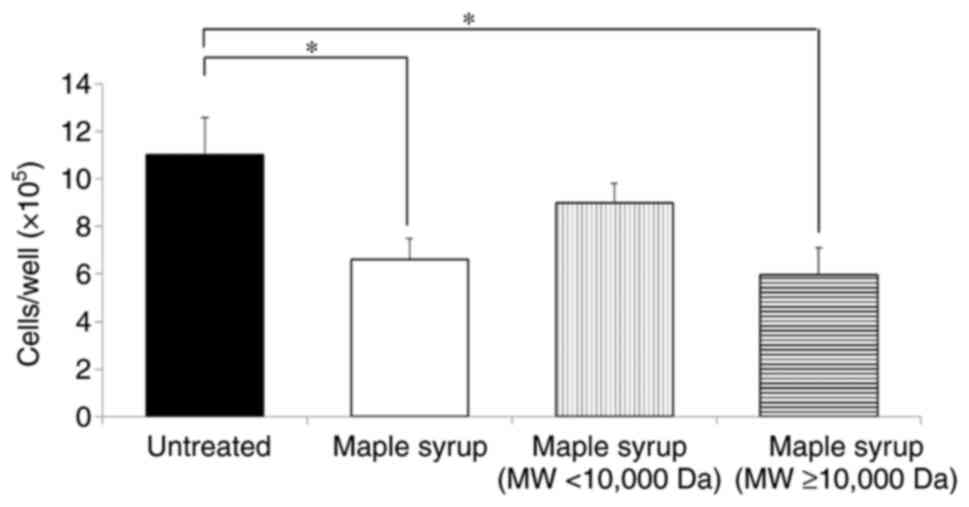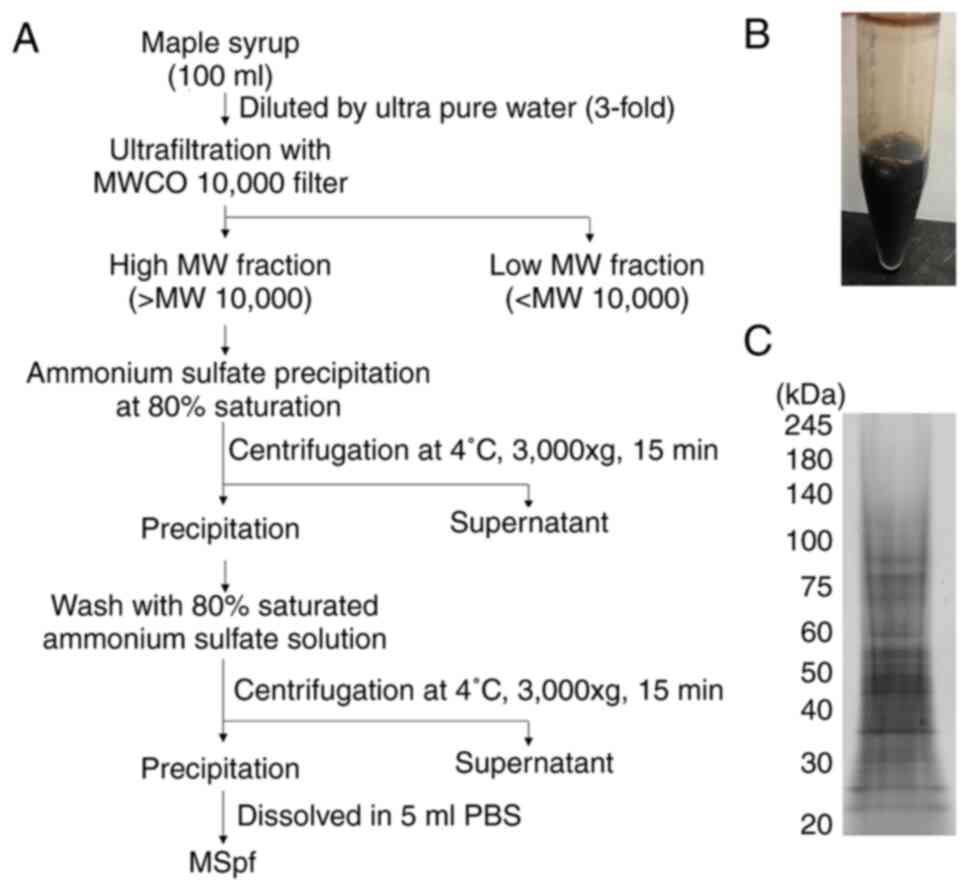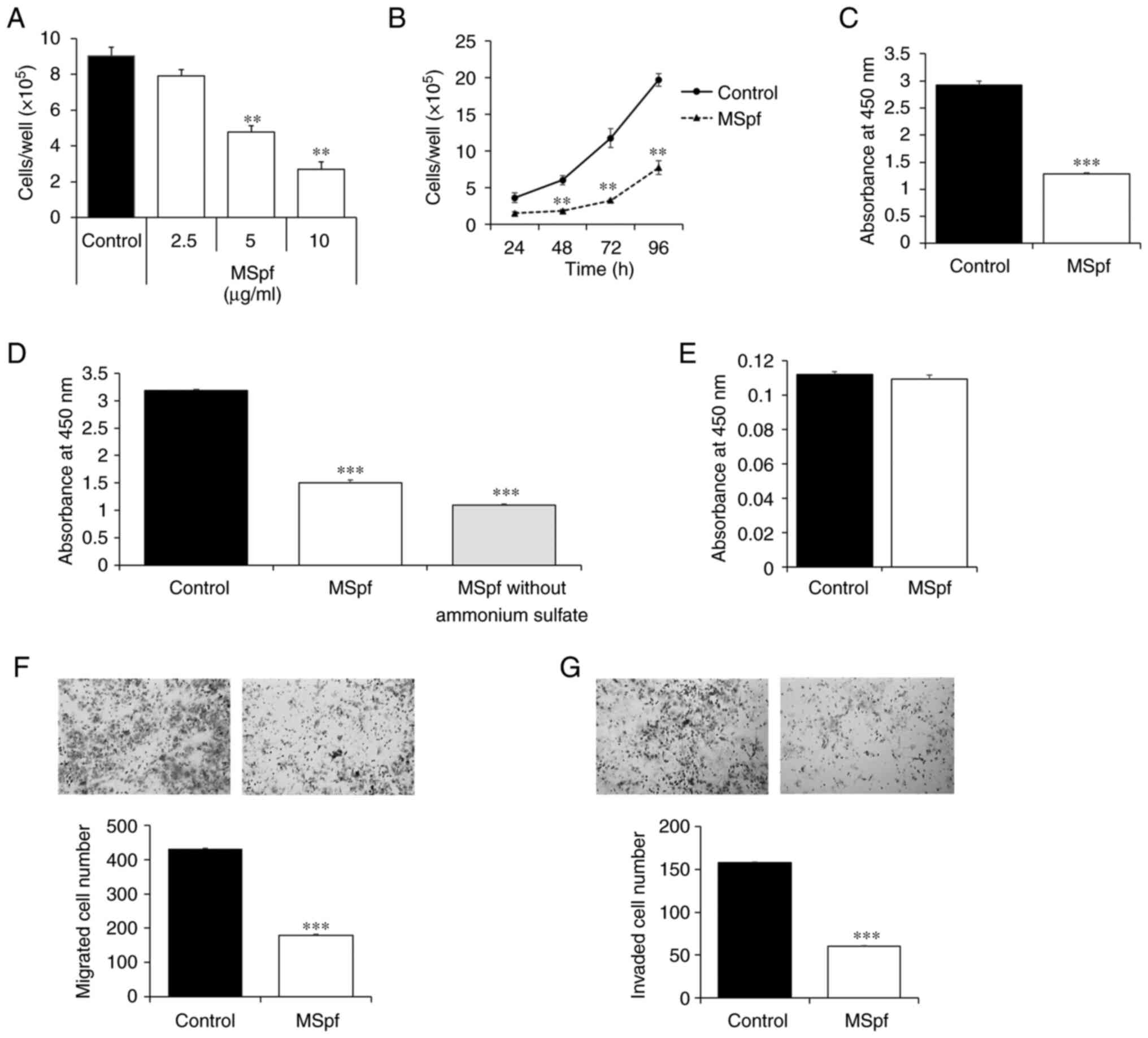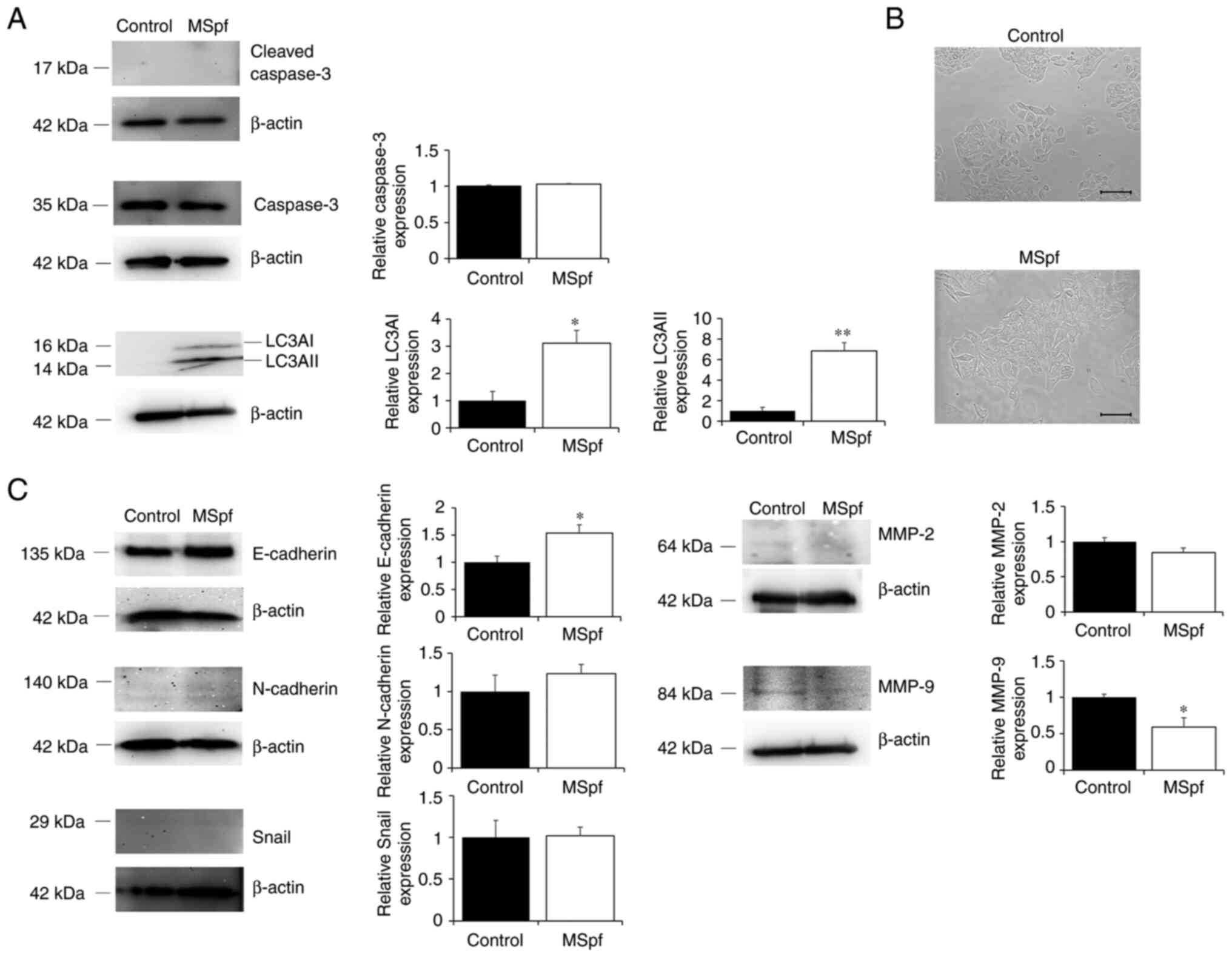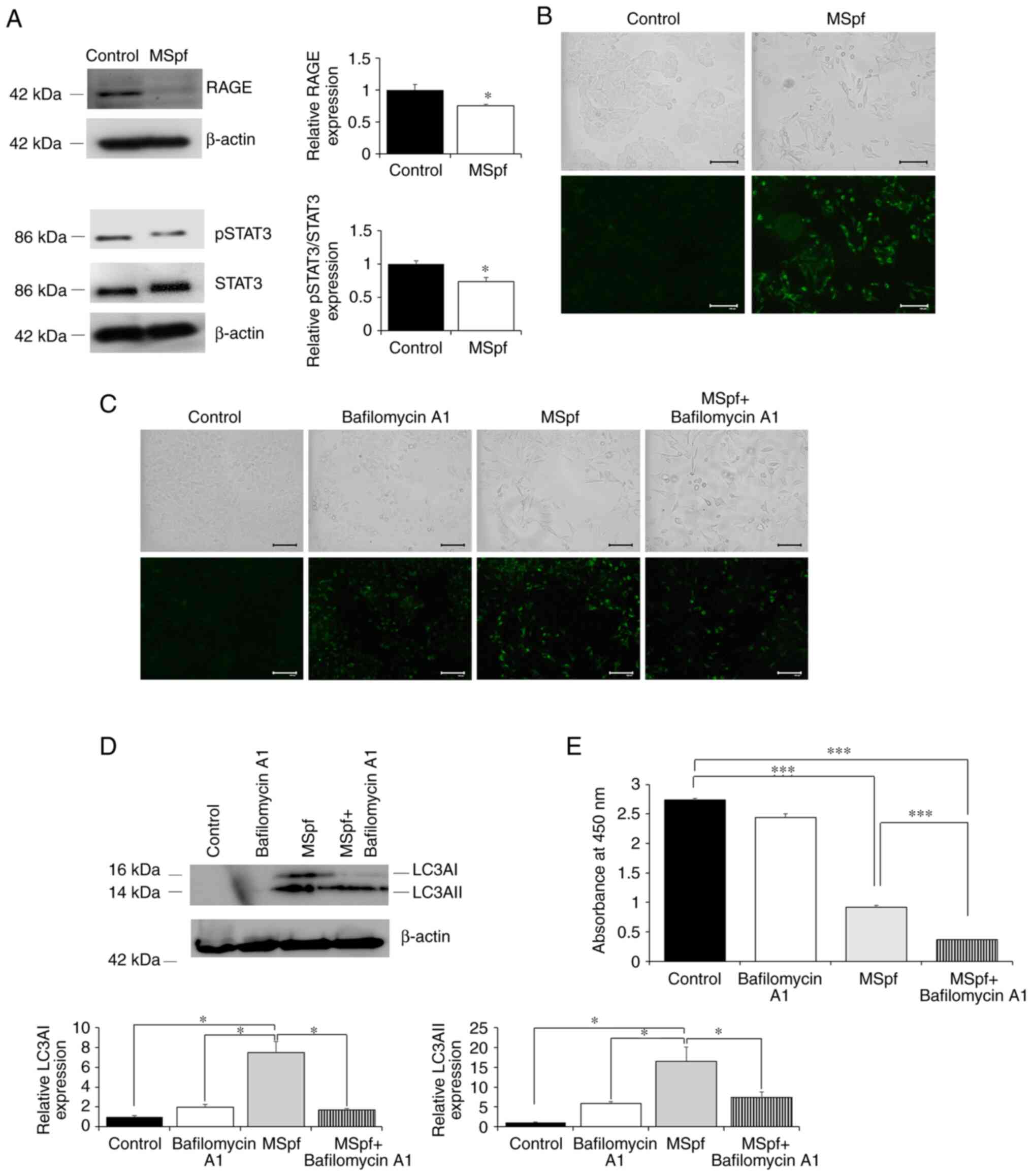|
1
|
Sung H, Ferlay J, Siegel RL, Laversanne M,
Soerjomataram I, Jemal A and Bray F: Global cancer statistics 2020:
GLOBOCAN estimates of incidence and mortality worldwide for 36
cancers in 185 countries. CA Cancer J Clin. 71:209–249. 2021.
View Article : Google Scholar : PubMed/NCBI
|
|
2
|
Siegel RL, Miller KD, Fuchs HE and Jemal
A: Cancer statistics, 2022. CA Cancer J Clin. 72:7–33. 2022.
View Article : Google Scholar : PubMed/NCBI
|
|
3
|
Dutta S, Mahalanobish S, Saha S, Ghosh S
and Sil PC: Natural products: An upcoming therapeutic approach to
cancer. Food Chem Toxicol. 128:240–255. 2019. View Article : Google Scholar : PubMed/NCBI
|
|
4
|
Siegel RL, Miller KD and Jemal A: Cancer
statistics, 2018. CA Cancer J Clin. 68:7–30. 2018. View Article : Google Scholar : PubMed/NCBI
|
|
5
|
Cheraghi O, Dehghan G, Mahdavi M,
Rahbarghazi R, Rezabakhsh A, Charoudeh HN, Iranshahi M and
Montazersaheb S: Potent anti-angiogenic and cytotoxic effect of
conferone on human colorectal adenocarcinoma HT-29 cells.
Phytomedicine. 23:398–405. 2016. View Article : Google Scholar : PubMed/NCBI
|
|
6
|
Tundis R and Loizzo MR: A review of the
traditional uses, phytochemistry and biological activities of the
genus santolina. Planta Med. 84:627–637. 2018. View Article : Google Scholar : PubMed/NCBI
|
|
7
|
Castro-Puyana M, Pérez-Sánchez A, Valdés
A, Ibrahim OHM, Suarez-Álvarez S, Ferragut JA, Micol V, Cifuentes
A, Ibáñez E and García-Cañas V: Pressurized liquid extraction of
Neochloris oleoabundans for the recovery of bioactive carotenoids
with anti-proliferative activity against human colon cancer cells.
Food Res Int. 99:1048–1055. 2017. View Article : Google Scholar : PubMed/NCBI
|
|
8
|
Nimalaratne C, Blackburn J and Lada RR: A
comparative physicochemical analysis of maple (Acer
saccharum Marsh.) syrup produced in North America with special
emphasis on seasonal changes in Nova Scotia maple syrup
composition. J Food Compos Anal. 92:1035732020. View Article : Google Scholar
|
|
9
|
Saraiva A, Carrascosa C, Ramos F, Raheem
D, Lopes M and Raposo A: Maple syrup: Chemical analysis and
nutritional profile, health impacts, safety and quality control,
and food industry applications. Int J Environ Res Public Health.
19:136842022. View Article : Google Scholar : PubMed/NCBI
|
|
10
|
Zhu K, Aykas DP and Rodriguez-Saona LE:
Pattern recognition approach for the screening of potential
adulteration of traditional and bourbon barrel-aged maple syrups by
spectral fingerprinting and classical methods. Foods. 11:22112022.
View Article : Google Scholar : PubMed/NCBI
|
|
11
|
St-Pierre P, Pilon G, Dumais V, Dion C,
Dubois MJ, Dubé P, Desjardins Y and Marette A: Comparative analysis
of maple syrup to other natural sweeteners and evaluation of their
metabolic responses in healthy rats. J Funct Foods. 11:460–471.
2014. View Article : Google Scholar
|
|
12
|
Nagai N, Yamamoto T, Tanabe W, Ito Y,
Kurabuchi S, Mitamura K and Taga A: Changes in plasma glucose in
Otsuka Long-Evans Tokushima Fatty rats after oral administration of
maple syrup. J Oleo Sci. 64:331–335. 2015. View Article : Google Scholar : PubMed/NCBI
|
|
13
|
Yamamoto T, Uemura K, Moriyama K, Mitamura
K and Taga A: Inhibitory effect of maple syrup on the cell growth
and invasion of human colorectal cancer cells. Oncol Rep.
33:1579–1584. 2015. View Article : Google Scholar : PubMed/NCBI
|
|
14
|
Yamamoto T, Nishita T and Taga A:
Dark-colored maple syrup treatment induces S-phase cell cycle
arrest via reduced proliferating cell nuclear antigen expression in
colorectal cancer cells. Oncol Lett. 17:2713–2720. 2019.PubMed/NCBI
|
|
15
|
Yamamoto T, Sato K, Kubota Y, Mitamura K
and Taga A: Effect of dark-colored maple syrup on cell
proliferation of human gastrointestinal cancer cell. Biomed Rep.
7:6–10. 2017. View Article : Google Scholar : PubMed/NCBI
|
|
16
|
Legault J, Girard-Lalancette K, Grenon C,
Dussault C and Pichette A: Antioxidant activity, inhibition of
nitric oxide overproduction, and in vitro antiproliferative effect
of maple sap and syrup from Acer saccharum. J Med Food.
13:460–468. 2010. View Article : Google Scholar : PubMed/NCBI
|
|
17
|
González-Sarrías A, Li L and Seeram NP:
Anticancer effects of maple syrup phenolics and extracts on
proliferation, apoptosis, and cell cycle arrest of human colon
cells. J Funct Foods. 4:185–196. 2012. View Article : Google Scholar
|
|
18
|
González-Sarrías A, Ma H, Edmonds ME and
Seeram NP: Maple polyphenols, ginnalins A-C, induce S- and
G2/M-cell cycle arrest in colon and breast cancer cells mediated by
decreasing cyclins A and D1 levels. Food Chem. 136:636–642. 2013.
View Article : Google Scholar : PubMed/NCBI
|
|
19
|
Perkins TD and van den Berg AK: Maple
syrup-production, composition, chemistry, and sensory
characteristics. Adv Food Nutr Res. 56:101–143. 2009. View Article : Google Scholar : PubMed/NCBI
|
|
20
|
Zhang Y, Yuan T, Li L, Nahar P, Slitt A
and Seeram NP: Chemical compositional, biological, and safety
studies of a novel maple syrup derived extract for nutraceutical
applications. J Agric Food Chem. 62:6687–6698. 2014. View Article : Google Scholar : PubMed/NCBI
|
|
21
|
Camara M, Cournoyer M, Sadiki M and Martin
N: Characterization and removal of buddy off-flavor in maple syrup.
J Food Sci. 84:1538–1546. 2019. View Article : Google Scholar : PubMed/NCBI
|
|
22
|
Sabik H, Fortin J and Martin N:
Identification of pyrazine derivatives in a typical maple syrup
using headspace solid-phase microextraction with gas
chromatography-mass spectrometry. Food Chem. 133:1006–1010. 2012.
View Article : Google Scholar
|
|
23
|
Toufeili I, Itani M, Zeidan M, Al Yamani O
and Kharroubi S: Nutritional and functional potential of carob
syrup versus date and maple syrups. Food Technol Biotechnol.
60:266–278. 2022. View Article : Google Scholar : PubMed/NCBI
|
|
24
|
Luo X, Dan W, Luo X, Zhu X, Wang G, Ning
Z, Li Y, Ma X, Yang R, Jin S, et al: Caveolin 1-related autophagy
initiated by aldosterone-induced oxidation promotes liver
sinusoidal endothelial cells defenestration. Redox Biol.
13:508–521. 2017. View Article : Google Scholar : PubMed/NCBI
|
|
25
|
Siemens H, Jackstadt R, Hünten S, Kaller
M, Menssen A, Götz U and Hermeking H: miR-34 and SNAIL form a
double-negative feedback loop to regulate epithelial-mesenchymal
transitions. Cell Cycle. 10:4256–4271. 2011. View Article : Google Scholar : PubMed/NCBI
|
|
26
|
Silva FFVE, Padín-Iruegas ME, Caponio VCA,
Lorenzo-Pouso AI, Saavedra-Nieves P, Chamorro-Petronacci CM,
Suaréz-Peñaranda J and Pérez-Sayáns M: Caspase 3 and cleaved
caspase 3 expression in tumorogenesis and its correlations with
prognosis in head and neck cancer: A systematic review and
meta-analysis. Int J Mol Sci. 23:119372022. View Article : Google Scholar : PubMed/NCBI
|
|
27
|
Kim YK, Shin JS and Nahm MH: NOD-like
receptors in infection, immunity, and diseases. Yonsei Med J.
57:5–14. 2016. View Article : Google Scholar : PubMed/NCBI
|
|
28
|
Chen RJ, Lee YH, Yeh YL, Wang YJ and Wang
BJ: The roles of autophagy and the inflammasome during
environmental stress-triggered skin inflammation. Int J Mol Sci.
17:20632016. View Article : Google Scholar : PubMed/NCBI
|
|
29
|
Henning C and Glomb MA: Pathways of the
Maillard reaction under physiological conditions. Glycoconj J.
33:499–512. 2016. View Article : Google Scholar : PubMed/NCBI
|
|
30
|
Teodorowicz M, van Neerven J and Savelkoul
H: Food processing: The Influence of the Maillard reaction on
immunogenicity and allergenicity of food proteins. Nutrients.
9:8352017. View Article : Google Scholar : PubMed/NCBI
|
|
31
|
Sato K, Nagai N, Yamamoto T, Mitamura K
and Taga A: Identification of a novel oligosaccharide in maple
syrup as a potential alternative saccharide for diabetes mellitus
patients. Int J Mol Sci. 20:50412019. View Article : Google Scholar : PubMed/NCBI
|
|
32
|
Hollenbach M: The role of glyoxalase-I
(Glo-I), advanced glycation endproducts (AGEs), and their receptor
(RAGE) in chronic liver disease and hepatocellular carcinoma (HCC).
Int J Mol Sci. 18:24662017. View Article : Google Scholar : PubMed/NCBI
|
|
33
|
Chen RJ, Lyu YJ, Chen YY, Lee YC, Pan MH,
Ho YS and Wang YJ: Chloroquine potentiates the anticancer effect of
pterostilbene on pancreatic cancer by inhibiting autophagy and
downregulating the RAGE/STAT3 pathway. Molecules. 26:67412021.
View Article : Google Scholar : PubMed/NCBI
|
|
34
|
Kang R, Loux T, Tang D, Schapiro NE,
Vernon P, Livesey KM, Krasinskas A, Lotze MT and Zeh HJ III: The
expression of the receptor for advanced glycation endproducts
(RAGE) is permissive for early pancreatic neoplasia. Proc Natl Acad
Sci USA. 109:7031–7036. 2012. View Article : Google Scholar : PubMed/NCBI
|
|
35
|
Sheu ML, Pan LY, Hu HY, Su HL, Sheehan J,
Tsou HK and Pan HC: Potential therapeutic effects of
thiazolidinedione on malignant glioma. Int J Mol Sci. 23:135102022.
View Article : Google Scholar : PubMed/NCBI
|
|
36
|
Li JK, Zhu PL, Wang Y, Jiang XL, Zhang Z,
Zhang Z and Yung KK: Gracillin exerts anti-melanoma effects in
vitro and in vivo: Role of DNA damage, apoptosis and autophagy.
Phytomedicine. 108:1545262023. View Article : Google Scholar : PubMed/NCBI
|
|
37
|
Sato K, Yamamoto T, Mitamura K and Taga A:
Separation of fructosyl oligosaccharides in maple syrup by using
charged aerosol detection. Foods. 10:31602021. View Article : Google Scholar : PubMed/NCBI
|
|
38
|
Zeisberg M and Neilson EG: Biomarkers for
epithelial-mesenchymal transitions. J Clin Invest. 119:1429–1437.
2009. View Article : Google Scholar : PubMed/NCBI
|
|
39
|
Mittal V: Epithelial mesenchymal
transition in tumor metastasis. Annu Rev Pathol. 13:395–412. 2018.
View Article : Google Scholar : PubMed/NCBI
|
|
40
|
Liu J, Chen XF, Zhou XR, Yi RK, Yang ZN
and Zhao X: Lactobacillus fermentum ZS09 mediates
epithelial-mesenchymal transition (EMT) by regulating the
transcriptional activity of the Wnt/β-catenin signalling pathway to
inhibit colon cancer activity. J Inflamm Res. 14:7281–7293. 2021.
View Article : Google Scholar : PubMed/NCBI
|
|
41
|
Chae U, Kim B, Kim H, Park YH, Lee SH, Kim
SU and Lee DS: Peroxiredoxin-6 regulates p38-mediated
epithelial-mesenchymal transition in HCT116 colon cancer cells. J
Biol Res (Thessalon). 28:222021. View Article : Google Scholar : PubMed/NCBI
|
|
42
|
Wheelock MJ, Shintani Y, Maeda M, Fukumoto
Y and Johnson KR: Cadherin switching. J Cell Sci. 121:727–735.
2008. View Article : Google Scholar : PubMed/NCBI
|
|
43
|
Mao L, Yang J, Yue J, Chen Y, Zhou H, Fan
D, Zhang Q, Buraschi S, Iozzo RV and Bi X: Decorin deficiency
promotes epithelial-mesenchymal transition and colon cancer
metastasis. Matrix Biol. 95:1–14. 2021. View Article : Google Scholar : PubMed/NCBI
|
|
44
|
Shay G, Lynch CC and Fingleton B: Moving
targets: Emerging roles for MMPs in cancer progression and
metastasis. Matrix Biol. 44–46. 200–206. 2015.
|
|
45
|
Lin TA, Lin WS, Chou YC, Nagabhushanam K,
Ho CT and Pan MH: Oxyresveratrol inhibits human colon cancer cell
migration through regulating epithelial-mesenchymal transition and
microRNA. Food Funct. 12:9658–9668. 2021. View Article : Google Scholar : PubMed/NCBI
|
|
46
|
Lai MF, Liu LL, Zhu L, Feng W, Luo J, Liu
Y and Deng S: Triptolide reverses epithelial-mesenchymal transition
in glioma cells via inducing autophagy. Ann Transl Med. 9:13042021.
View Article : Google Scholar : PubMed/NCBI
|
|
47
|
Li Q, Liu S, Yang G, Li M, Qiao P and Xue
Q: Naringenin inhibits autophagy and epithelial-mesenchymal
transition of human lens epithelial cells by regulating the Smad2/3
pathway. Drug Dev Res. 83:389–396. 2022. View Article : Google Scholar : PubMed/NCBI
|
|
48
|
Twarda-Clapa A, Olczak A, Bialkowska AM
and Koziolkiewicz M: Advanced glycation end-products (AGEs):
Formation, chemistry, classification, receptors, and diseases
related to AGEs. Cells. 11:13122022. View Article : Google Scholar : PubMed/NCBI
|
|
49
|
Vistoli G, De Maddis D, Cipak A, Zarkovic
N, Carini M and Aldini G: Advanced glycoxidation and lipoxidation
end products (AGEs and ALEs): An overview of their mechanisms of
formation. Free Radical Res. 47 (Suppl 1):S3–S27. 2013. View Article : Google Scholar
|
|
50
|
Basta G, Schmidt AM and De Caterina R:
Advanced glycation end products and vascular inflammation:
Implications for accelerated atherosclerosis in diabetes.
Cardiovasc Res. 63:582–592. 2004. View Article : Google Scholar : PubMed/NCBI
|
|
51
|
Chen CY, Abell AM, Moon YS and Kim KH: An
advanced glycation end product (AGE)-receptor for AGEs (RAGE) axis
restores adipogenic potential of senescent preadipocytes through
modulation of p53 protein function. J Biol Chem. 287:44498–44507.
2012. View Article : Google Scholar : PubMed/NCBI
|
|
52
|
Galluzzi L, Pietrocola F, Bravo-San Pedro
JM, Amaravadi RK, Baehrecke EH, Cecconi F, Codogno P, Debnath J,
Gewirtz DA, Karantza V, et al: Autophagy in malignant
transformation and cancer progression. EMBO J. 34:856–880. 2015.
View Article : Google Scholar : PubMed/NCBI
|
|
53
|
Liu Z, Chen P, Gao H, Gu Y, Yang J, Peng
H, Xu X, Wang H, Yang M, Liu X, et al: Ubiquitylation of autophagy
receptor Optineurin by HACE1 activates selective autophagy for
tumor suppression. Cancer Cell. 26:106–120. 2014. View Article : Google Scholar : PubMed/NCBI
|
|
54
|
Kong W, Zhu H, Zheng S, Yin G, Yu P, Shan
Y, Liu X, Ying R, Zhu H and Ma S: Larotrectinib induces autophagic
cell death through AMPK/mTOR signalling in colon cancer. J Cell Mol
Med. 26:5539–5550. 2022. View Article : Google Scholar : PubMed/NCBI
|
|
55
|
Huang B, Lang X and Li X: The role of
IL-6/JAK2/STAT3 signaling pathway in cancers. Front Oncol.
12:10231772022. View Article : Google Scholar : PubMed/NCBI
|
|
56
|
Hashemi M, Sabouni E, Rahmanian P,
Entezari M, Mojtabavi M, Raei B, Zandieh MA, Behroozaghdam M,
Mirzaei S, Hushmandi K, et al: Deciphering STAT3 signaling
potential in hepatocellular carcinoma: Tumorigenesis, treatment
resistance, and pharmacological significance. Cell Mol Biol Lett.
28:332023. View Article : Google Scholar : PubMed/NCBI
|
|
57
|
Al-Hetty HRAK, Abdulameer SJ, Alkubaisy
SA, Zaid SA, Jalil AT and Jasim IK: STAT3 signaling in pancreatic
ductal adenocarcinoma: A candidate therapeutic target. Pathol Res
Pract. 245:1544252023. View Article : Google Scholar : PubMed/NCBI
|
|
58
|
Czikora Á, Erdélyi K, Ditrói T, Szántó N,
Jurányi EP, Szanyi S, Tóvári J, Strausz T and Nagy P: Cystathionine
β-synthase overexpression drives metastatic dissemination in
pancreatic ductal adenocarcinoma via inducing
epithelial-to-mesenchymal transformation of cancer cells. Redox
Biol. 57:1025052022.(Epub ahead of print). View Article : Google Scholar : PubMed/NCBI
|
|
59
|
Guo H, Zheng L, Guo Y, Han L, Yu J and Lai
F: Curculigoside represses the proliferation and metastasis of
osteosarcoma via the JAK/STAT and NF-κB signaling pathways. Biol
Pharm Bull. 45:1466–1475. 2022. View Article : Google Scholar : PubMed/NCBI
|
|
60
|
Cui B, Yu C, Zhang S, Hou X, Wang Y, Wang
J, Zhuang S and Liu F: Delayed administration of nintedanib
ameliorates fibrosis progression in CG-induced peritoneal fibrosis
mouse model. Kidney Dis (Basel). 8:319–333. 2022. View Article : Google Scholar : PubMed/NCBI
|
|
61
|
Fang W, Huang J, Wang J, Huang T, Lin D
and Yin J: Blockade of interleukin-6 receptor attenuates apoptosis
and modulates the inflammatory response in Mycoplasma pneumoniae
infected A549 cells. Am J Transl Res. 14:6187–6195. 2022.PubMed/NCBI
|
|
62
|
Tossetta G, Fantone S, Busilacchi EM, Di
Simone N, Giannubilo SR, Scambia G, Giordano A and Marzioni D:
Modulation of matrix metalloproteases by ciliary neurotrophic
factor in human placental development. Cell Tissue Res.
390:113–129. 2022. View Article : Google Scholar : PubMed/NCBI
|
|
63
|
Wu K, Wu X, Liang Y, Wang T, Wu D, Li L
and Wang Z: Inhibitory effects of total triterpenoids isolated from
the Hedyotis diffusa willd on H1975 cells. Front Pharmacol.
13:9224772022. View Article : Google Scholar : PubMed/NCBI
|















